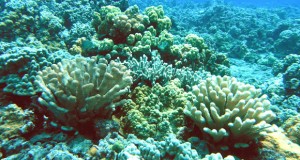Coral Reefs

Why care about coral reefs?
Healthy coral reefs are some of the most biologically diverse and economically valuable ecosystems on earth, providing food, jobs, recreational opportunities, coastal protection, cultural significance, and other important services to billions of people worldwide. In a recent report by USGS, Hawaii’s coral reefs were valued at $863 million per year. Unfortunately, many of the world’s coral reefs have been damaged or destroyed due to increasing human impacts, climate change, and other factors. Due to the global bleaching event that occurred in 2014-2016, along with regional disease outbreaks like the stony coral tissue loss disease in the Caribbean, corals are estimated to decline greatly by 2050. The decline and loss of coral reef ecosystems already has significant social, economic, and ecological impacts on people and communities in the U.S. and around the world.
Benefits
Coral reefs provide habitat for our nearshore fisheries, protect coasts from waves and storms, and support tourism and fishing industries worth billions of dollars. Coral reefs are also fundamental to the fabric of local communities, providing a source of food, materials and traditional activities.
Threats
Hawai’i’s coral reefs have experienced recent bleaching events, with the 2014 and 2015 events have unprecedented amounts of bleaching. In these events, up to 50% of the reef died in some locations, due to temperature effects from climate change. Combined with other factors like population density, increased coastal development, land-based sources of pollution, increased sediments in the water, damage by tourists and divers, groundings, poor water quality from runoff and sewage treatment, and overfishing, climate change is critically affecting our coral reefs, and the benefits we depend upon. Other effects from climate change like sea level rise and larger and stronger storms will also contribute to the degradation of our coral reefs.
Strategy
DAR supports critical planning efforts, community action, awareness-raising activities, scientific research with direct management applications, and on-the-ground management projects. Key outcomes of this work include greater capacity to enforce coral reef protections and increased understanding of the key threats to reef ecosystems at priority sites.
Rules
Learn more about coral and live rock, rules pertaining to them, and view descriptive information about eight common Hawaiian corals on this page.
Coral Reefs Site
Please visit the Coral Reefs Site for more information about coral reefs in the State of Hawaiʻi.
